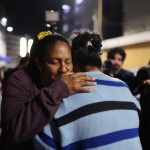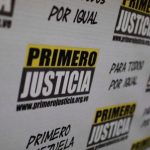María Esperanza Sánchez García was imprisoned for three years and two weeks by the Daniel Ortega regime, until, along with 221 other political prisoners, she was exiled on February 9 to the United States. The torture and all the suffering, affirms the woman from Matagalpa, “for my country it has been worth it.”
Until a day later, on Friday the 10th, Sánchez was able to communicate with his relatives in Nicaragua. “It has been difficult, but here we are, grateful for the support received,” she says in the United States.
She has been a well-known opponent of the Daniel Ortega regime and stood out for participating in marches and protests from 2018 until she was arrested on January 26, 2020. She was prosecuted together with Víctor Manuel Soza Herrera and both were sentenced to ten years in prison and 500 day fine, equivalent to 31,190 córdobas, for alleged drug trafficking.
Sánchez says that he did know Soza. But he was detained in Matagalpa and she was detained in a safe house in Managua. “They took some flags and some T-shirts from me, because I went to the mass and then we made a picket (in protest) when the image of the Virgin of Fatima arrived,” he recalls.
When they arrested her, they beat her so much that Sánchez still has spinal injuries.
“They interrogated me, they wanted me to give them the names of people, but since I didn’t tell them, they began to attack me, to beat me. They took me out many times at night for those interrogations and after that I suffered a lot of psychological abuse. But here I am. I do think that it has been worth it for my homeland, to see that my grandchildren can live in a free Nicaragua,” says Sánchez.
The executioners always asked her why she never covered her face, while she was in protests, and she always gave the same answer: “I only exercise my right, because supposedly we live in a free country.”
Santos Sánchez, known by the pseudonym “El Comarada” and father of Sánchez García, was a well-known and tireless fighter against social injustices, such that the Somoza dictatorship and also that of the first period of Daniel Ortega in the 1980s They imprisoned him multiple times.
“I would protest again, of course I would … it is in my blood. My father was a fighter and he gave his life for us. I would do it again,” says Sánchez.
the banishment
Sánchez says that they spent many days in a prison regime in which they were not allowed to go out into the patio to sunbathe. Only once, half an hour, separated (the political prisoners) and always in custody.”
On February 9, she was asleep, around 10:30 pm when they came to wake her up. “I was the first,” she recalls.
He adds that they were taken from the cells to take them first to La Modelo prison and from there to the place where an airplane was.
“We knew nothing, not even where they were taking us. The fear was that they would transfer us to Cuba or Venezuela. It is that that was ugly, traumatic ”, says Sánchez.
Now she is in the United States, exiled and, according to the Daniel Ortega regime, without nationality.
Sánchez thanks everyone who was aware of her. “I tell you that it was worth it. I don’t know how long it will take for me to return to my homeland, but I hope I don’t die outside my homeland. One day that dictatorship will fall.
Text published by CSI Mosaic

















